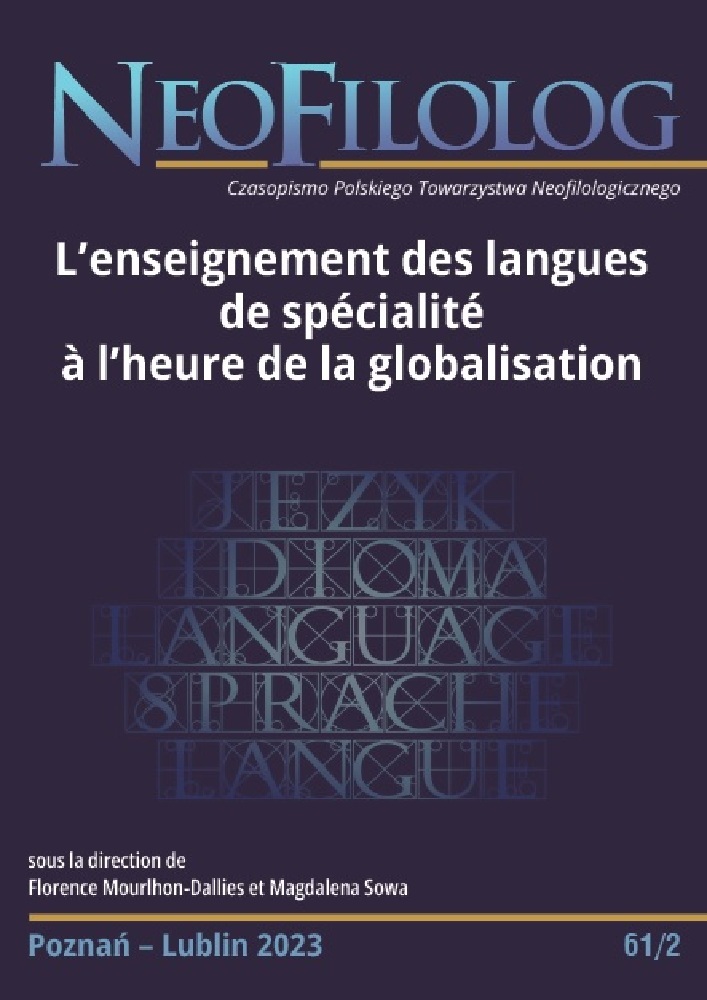Abstract
The aim of this article is to investigate student perception of distance learning in “French for diplomats” , as well as to observe whether and to what extent recent developments in virtual learning environments in language learning have proven effective and may have promoted international collaboration. The study, carried out in 2021/2022 at the Institute of Romance Studies of the University of Warsaw, revealed that a significant proportion of students with experience of the “French for diplomats” distance course are very satisfied with the virtual courses. After observing the encouraging reactions of learners during the course, we decided to carry out our research on their experiences. We started from the premise that distance learning ofthe language for specific purposes could be beneficial to the learning process. Our reflections focused mainly on building intercultural competence, but also on the changing representations of the profession of diplomat and, consequently, on the opportunities that virtual courses open. It was found that the shift from face-to-face to digital has given teachers new tools and modalities that enrich the quality of the lesson. The teaching of specialized languages such as “French for diplomats” can nowadays include videoconferencing with a diplomat based in Guatemala or Brussels. Thus, the abandonment of face-to-face lessons has given back pedagogical freedom and helped teachers look for original solutions.
References
Abdallah-Pretceille M. (1996), Compétence culturelle, compétence interculturelle. « Le Français dans le monde, Recherches et applications », 28–38.
Albero B., Thibaut F. (2006), ELUE France, (in :) Conférence des Recteurs des Universités italiennes (CRUI) (Éd.), « Les universités européennes à l’heure du e-learning : Regards sur la Finlande, l’Italie et la France ». Online : http://edutice.archives-ouvertes.fr/edutice-00194332/fr/ [consulté 30.10.2023].
Bonnéry S., Douat É. (dir.) (2020), L’éducation aux temps du coronavirus. Paris : La Dispute.
Hsab G., Stoiciu G. (2011), Communication internationale et communication interculturelle : des champs croisés, des frontières ambulantes, (in :) Agbobli C., Hsab G. (dir.), « Communication internationale et communication interculturelle : regards épistémologiques et espaces de pratique ». Québec : Presses de l’Université du Québec, 9–26. DOI: https://doi.org/10.2307/j.ctv18pgzw4.5
Kadushin Ch., Livert D. (2002), Friendship, Contact, and Peace Education, (in :) Salomon G., Nevo B. (eds), “Peace Education: The Concept, Principles, and Practices Around the World”. Mahwah, NJ: Erlbaum, 117–126.
Karsenti T., Poellhuber B., Roy N., Parent S. (2020), Le numérique et l’enseignement au temps de la COVID-19 : entre défis et perspectives. « Revue internationale des technologies en pédagogie universitaire », 17(2), 1–4. DOI: https://doi.org/10.18162/ritpu-2020-v17n2-01
Kervyn N., Gomez Zuniga R.A., Vangrunderbeeck P., Castillo Villar F.R., Cavazos Arroyo J. (2020), Creating and Teaching an Online Business Case Study Using Twine. « Revue internationale des technologies en pédagogie universitaire », 17(2), 61–66. DOI: https://doi.org/10.18162/ritpu-2020-v17n2-07
Ketele de J.-M. (2010), La pédagogie universitaire : un courant en plein développement, « Revue française de pédagogie », 172. DOI: https://doi.org/10.4000/rfp.2168
Mangenot F., Zourou K. (2007), Susciter le dialogue interculturel en ligne, « Lidil », 36. Online: http://journals.openedition.org/lidil/2413 [consulté 30.10.2023]. DOI: https://doi.org/10.4000/lidil.2413
Mourlhon-Dallies F. (2008), Enseigner une langue à des fins professionnelles. France : Didier. DOI: https://doi.org/10.14375/NP.9782278069989
Porcher L., Abdallah-Pretceille M. (1998), Éthique de la diversité et éducation. France : PUF. DOI: https://doi.org/10.3917/puf.porch.1998.01
Schmitt F. (2023), Approche interculturelle et perspective co-culturelle en français langue étrangère en contexte pédagogique hétéroglotte. “Neofilolog”, 60/1, 31–44. DOI: https://doi.org/10.14746/n.2023.60.1.3
Soffer T., Cohen A. (2019), Students’ engagement characteristics predict success and completion of online courses, “Journal of Computer Assisted Learning”, (35/3), 278–389. DOI: https://doi.org/10.1111/jcal.12340
Sowa M., Djordjevic S., Komur-Thilloy G. (2015), Enseignement des langues de spécialité en Pologne et en France. Regards croisés, « Roczniki Humanistyczne », 63/10, 135–161. DOI: https://doi.org/10.18290/rh.2015.63.10-8
Sujecka-Zając J. (2021), Pédagogie universitaire rénovée à l’époque de la pandémie : comment passer de l’autre côté de l’écran ?, « Neofilolog », 57/2, 249–264. DOI: https://doi.org/10.14746/n.2021.57.2.6
Wojakowska M., Sosnowski W. (2023) ‘Językowy telemost’ jako nowa forma kształcenia kompetencji interkulturowej i doskonalenia warsztatu nauczyciela języka obcego, „Neofilolog”, 60/1, 174–186. DOI: https://doi.org/10.14746/n.2023.60.1.13
License
Copyright (c) 2023 Marta Wojakowska

This work is licensed under a Creative Commons Attribution-NoDerivatives 4.0 International License.
Authors
Authors of texts accepted for publication in Neofilolog are required to complete, sign and return to the Editorial team’s office the Agreement for granting a royalty-free license to works with a commitment to grant a CC sub-license.
Under the agreement, the authors of the texts published in Neofilolog grant Adam Mickiewicz University in Poznań a non-exclusive, royalty-free license and authorize the use of Attribution-NoDerivatives 4.0 International (CC BY-ND 4.0) Creative Commons sub-license.
The authors retain the right to the free disposal of the work.
Users
Interested Internet users are entitled to use works that have been published in Neofilolog since 2017, under the following conditions:
▪ attribution – obligation to provide, together with the distributed work, information about the authorship, title, source (link to the original work, DOI) and the license itself.
▪ no derivatives – the work must be preserved in its original form. Without the author's consent, it is not possible to distribute the modified work in the form of translations, publications, etc.
Copyrights are reserved for all texts published since 2017.
Miscellaneous
Adam Mickiewicz University in Poznań retains the property right as a whole (layout, graphic form, title, cover design, logo etc.).

